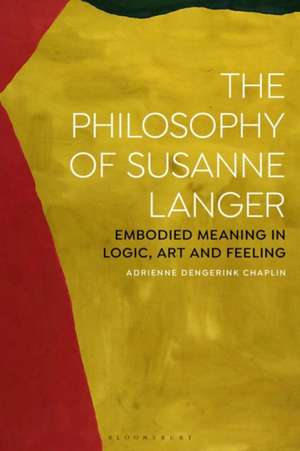The Philosophy of Susanne Langer: Embodied Meaning in Logic, Art and Feeling
Autor Adrienne Dengerink Chaplinen Limba Engleză Hardback – 16 oct 2019
Preț: 778.29 lei
Preț vechi: 1115.54 lei
-30% Nou
Puncte Express: 1167
Preț estimativ în valută:
148.92€ • 155.91$ • 123.23£
148.92€ • 155.91$ • 123.23£
Carte tipărită la comandă
Livrare economică 07-21 aprilie
Preluare comenzi: 021 569.72.76
Specificații
ISBN-13: 9781350030558
ISBN-10: 1350030554
Pagini: 400
Dimensiuni: 156 x 234 mm
Greutate: 0.77 kg
Editura: Bloomsbury Publishing
Colecția Bloomsbury Academic
Locul publicării:London, United Kingdom
ISBN-10: 1350030554
Pagini: 400
Dimensiuni: 156 x 234 mm
Greutate: 0.77 kg
Editura: Bloomsbury Publishing
Colecția Bloomsbury Academic
Locul publicării:London, United Kingdom
Caracteristici
Examines
the
complex
and
intertwined
histories
of
Anglo-American
and
European
philosophy
in
the
mid-twentieth
century
Notă biografică
Adrienne
Dengerink
Chaplinis
a
Visiting
Research
Fellow
at
King's
College
London,
UK.
Cuprins
IntroductionPART
I:
CONTOURS1.
Life
and
Work2.
European
Philosophy
in
America3.
Philosophy
and
WomenPART
II:
SOURCES4.
Henry
M.
Sheffer:
Logical
Form
5.
Ernst
Cassirer:
Symbolic
Form6.
Alfred
N.
Whitehead:
Organic
Form
7.
Ludwig
Wittgenstein:
Expressive
FormPART
III:
CONTRIBUTIONS8.
The
Logic
of
Signs
and
Symbols9.
Art
as
the
Form
of
Feeling10.
Mind
as
Embodied
MeaningConclusionBibliographyIndex
Recenzii
Through
meticulous
research,
astute
analysis,
and
insightful
interpretation,
Dengerink
Chaplin
shows
how
Langer
combined
ideas
from
Wittgenstein,
Whitehead,
and
Cassirer
into
an
ambitious
and
original
philosophy
of
art
and
mind.
Often
ignored
or
misunderstood,
Langer
was
an
important
thinker
ahead
of
her
time.
Her
work
deserves
to
be
revisited;
this
path-breaking
book
tells
us
why.
Early in my career as a philosopher of art I dipped into Susanne Langer's writings on art. I thought I understood them. Reading Adrienne Dengerink Chaplin's book on Langer has shown me that I understood very little. The depth, the subtlety, passed me by. And of the extraordinary breadth of her philosophy in general, I knew nothing. What an eye-opener this deeply researched book has been for me -- and will be for many others. This is a Langer we knew not!
No matter how novel a new philosophical framework is or appears to be, it has antecedents and roots that influence and nourish it and without which it would not be possible to understand it. With this as her guiding thread, Adrienne Dengerink Chaplin has produced an insightful and indispensable account of the genesis and structure of Susanne Langer's lifelong researches on the symbolic processes and structures that create the meanings we live by.
It would be impossible to imagine a better introduction to Langer for contemporary audiences. Dengerink Chaplin has engaged the entirety of Langer's philosophical corpus, situated in its historical context, and shown in depth and detail the salience of her project to contemporary questions and concerns. Anyone interested in language, consciousness, mind, art and symbolism in all of its forms would profit immensely from reading this work.
This is the book on Langer that the scholarly community has been waiting for: a go-to reference for all the main aspects of her thought, her original ideas along with her complex relations with the top intellectuals of her day. One can read this volume as an introduction to philosophy in the 20th century, how it changed, grew, and in some ways declined.
Early in my career as a philosopher of art I dipped into Susanne Langer's writings on art. I thought I understood them. Reading Adrienne Dengerink Chaplin's book on Langer has shown me that I understood very little. The depth, the subtlety, passed me by. And of the extraordinary breadth of her philosophy in general, I knew nothing. What an eye-opener this deeply researched book has been for me -- and will be for many others. This is a Langer we knew not!
No matter how novel a new philosophical framework is or appears to be, it has antecedents and roots that influence and nourish it and without which it would not be possible to understand it. With this as her guiding thread, Adrienne Dengerink Chaplin has produced an insightful and indispensable account of the genesis and structure of Susanne Langer's lifelong researches on the symbolic processes and structures that create the meanings we live by.
It would be impossible to imagine a better introduction to Langer for contemporary audiences. Dengerink Chaplin has engaged the entirety of Langer's philosophical corpus, situated in its historical context, and shown in depth and detail the salience of her project to contemporary questions and concerns. Anyone interested in language, consciousness, mind, art and symbolism in all of its forms would profit immensely from reading this work.
This is the book on Langer that the scholarly community has been waiting for: a go-to reference for all the main aspects of her thought, her original ideas along with her complex relations with the top intellectuals of her day. One can read this volume as an introduction to philosophy in the 20th century, how it changed, grew, and in some ways declined.
